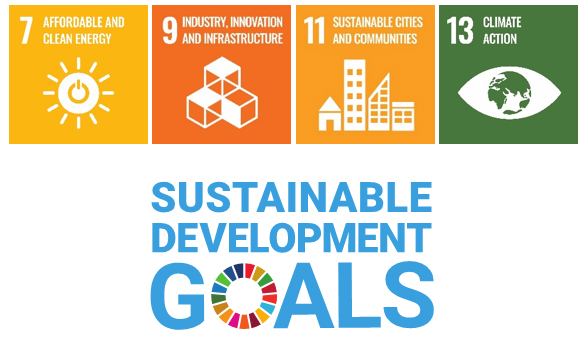Mitsui Fudosan to Promote the Greening of Power Consumption
at All Tokyo Facilities by Fiscal 2030
Greening of Power Consumption at 25 Buildings, Including 3 Tokyo Midtown Facilities
and Buildings in the Nihonbashi Area, by the End of Fiscal 2022
May 10, 2021
Mitsui Fudosan Co., Ltd.
Key Points of this Press Release
- Promote greening of power consumption*1 at all Tokyo facilities by fiscal 2030.
- Begin greening power consumption at 25 facilities, including Tokyo Midtown and key mixed-use buildings in the Nihonbashi area, by the end of fiscal 2022.
- Launched the Green Energy Supply Service in limited areas in April to respond to the green energy plans of tenants. Offers flexible options to suit customer needs to work together toward a carbon-free society.
- 1 Equivalent to the amount of electricity used by Mitsui Fudosan in shared common spaces (includes some partially owned areas; excludes electricity generated by each facility). “Greening” means effectively switching from electricity to renewable energy consumption through the use of non-fossil fuel certificates.
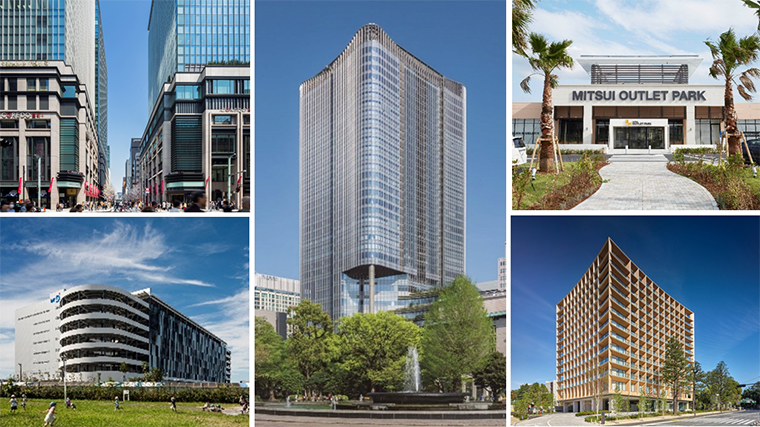
Top left: COREDO Muromachi 1,2, and 3; bottom left: Mitsui Fudosan Logistics Park Funabashi I,
center: Tokyo Midtown Hibiya, top right: MITSUI OUTLET PARK KISARAZU,
bottom right: Mitsui Garden Hotel Jingugaien Tokyo Premier
Tokyo, Japan, May 10, 2021 – Mitsui Fudosan Co., Ltd., a leading global real estate company headquartered in Tokyo, announced today that it will promote the greening of power consumption in the common areas of all facilities (hereafter, “Mitsui Fudosan’s power consumption”) that it owns in the Tokyo area (including partially owned facilities), such as office buildings, commercial facilities, hotels, logistics facilities, and rental housing, by fiscal 2030.
Of these, 25 buildings have been positioned as the first phase, including the 3 Tokyo Midtown facilities and all key mixed-use buildings in the Nihonbashi area. Greening of power consumption in these buildings will be completed by the end of fiscal 2022.
1.Mitsui Fudosan to accelerate greening of power consumption
In December 2020, Mitsui Fudosan concluded a comprehensive agreement with TEPCO Energy Partner, Incorporated*2 for the greening of power consumption in office buildings, etc. that it owns and leases in the Tokyo area, totaling approximately 600 million kWh, by fiscal 2030. In addition to this agreement, Mitsui Fudosan began greening power consumption in partnership with other power companies on April 1, 2021.
Furthermore, the greening of power consumption at Tokyo Midtown Yaesu (scheduled for completion in August 2022), to which power will be supplied by a specially designated power supply company, will utilize the environmental value of solar power generation facilities owned and developed by Mitsui Fudosan*3. We will also promote greening of power consumption in the Nihonbashi and Toyosu areas from the second half of fiscal 2021 through the use of non-fossil fuel certificates with tracking information.
In addition to these programs, Mitsui Fudosan targets the greening of all facilities it owns in the Tokyo area (including partially owned facilities) by fiscal 2030, and will expand schemes for greening power consumption that fit the needs of each facility.Mitsui Fudosan currently owns around 120 facilities. Based on this number, total annual greened power consumption is approximately 300 million kWh, which is equivalent to around 30 times the power consumption of the common areas of Tokyo Midtown Hibiya. The CO2 reduction effect of this program will be approximately 123,000 tonnes, roughly equivalent to the total emissions of 69,000 households*4.
As the first phase, Mitsui Fudosan’s power consumption will be greened at 25 buildings by the end of fiscal 2022. Combined with greened power consumption by tenants (see below), total greened power consumption at the end of fiscal 2022 is estimated to exceed 200 million kWh with a CO2 reduction effect of around 82,000 tonnes, which is equivalent to the electricity consumption of around 46,000 households*4
- 2 Release concerning the comprehensive agreement :https://www.mitsuifudosan.co.jp/corporate/news/2020/1221_01/
- 3 Provides green electricity with environmental value derived from five solar power generation facilities owned and developed by Mitsui Fudosan in Japan (Oita City, Oita Prefecture; Sanyo-Onoda City, Yamaguchi Prefecture; Tomakomai City, Hokkaido; Hachinohe City, Aomori Prefecture; and Omuta City, Fukuoka Prefecture).
Release concerning Tokyo Midtown Yaesu: https://www.mitsuifudosan.co.jp/corporate/news/2021/0408/ - 4 Source: Annual statistical survey on household CO2 emissions, Ministry of the Environment
How the greening of power consumption promoted by Mitsui Fudosan works (image)
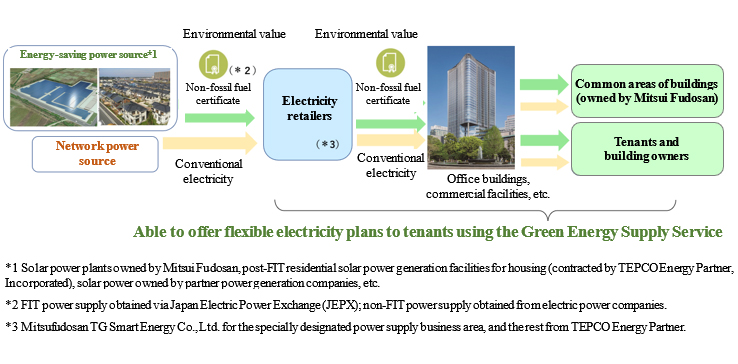
Buildings where Mitsui Fudosan’s power consumption will be greened by the end of fiscal 2022
- Tokyo Midtown
- Tokyo Midtown Hibiya
- Tokyo Midtown Yaesu (scheduled for completion in August 2022)
- Mitsui Main Building
- Nihonbashi Mitsui Tower
- Nihonbashi 1-chome Mitsui Building (COREDO Nihonbashi)
- Nihonbashi Muromachi Mitsui Tower (COREDO Muromachi Terrace)
- Muromachi Higashi Mitsui Building (COREDO Muromachi1)
- Muromachi Furukawa Mitsui Building (COREDO Muromachi2)
- Muromachi Chibagin Mitsui Building (COREDO Muromachi3)
- GRAN TOKYO NORTH TOWER
- SUMITOMO MITSUI BANKING CORPORATION BUILDING
- KASUMIGASEKI BUILDING
- Toyosu Bayside Cross Tower, and others totaling 25 buildings
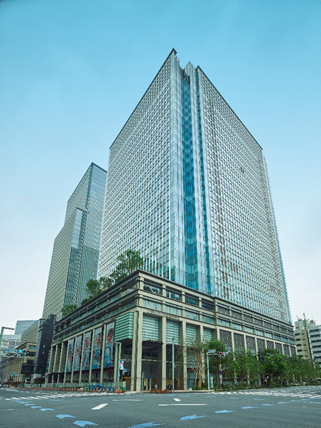
Nihonbashi Muromachi Mitsui Tower
2.About Mitsui Fudosan’s Green Energy Supply Service
The Green Energy Supply Service was designed for tenants and joint project owners of office buildings, etc. owned and leased by Mitsui Fudosan. Using various schemes for greening power consumption, the service essentially supplies renewable energy in these buildings through the use of non-fossil fuel certificates with tracking information.
Compliant with international standards such as RE100, this renewable energy service features flexibility regarding introduction, ratio of green power, etc. to suit the management plans and incremental greening plans of each tenant and joint project owner.
Mitsui Fudosan began offering this service to tenants on April 1, 2021.
Through the Green Energy Supply Service and other services, Mitsui Fudosan will actively encourage and support tenants and business partners to tackle RE100 and ESG challenges.
Tenant companies using Mitsui Fudosan’s Green Energy Supply Service
(Not all companies are listed; in Japanese alphabetical order)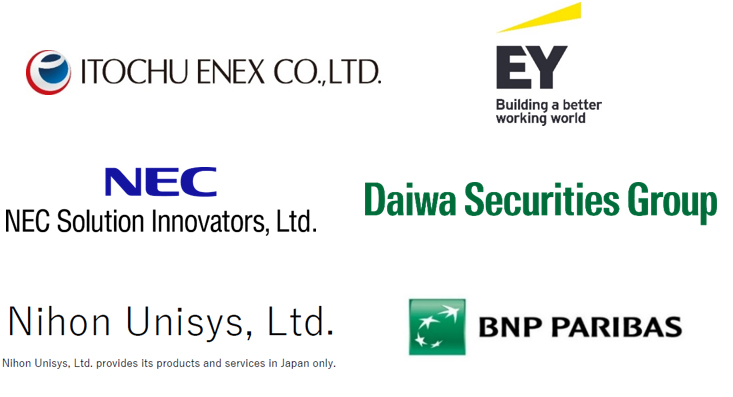
3.Reasons for and objectives of greening Mitsui Fudosan’s power consumption
The Paris Agreement, which was adopted in 2015, set the goal of becoming a carbon-free society. The Japanese government has also announced under its growth strategy the goal of net-zero greenhouse gas emissions by 2050. We are aware that the development and use of renewable energy is a social challenge that should be solved together by the public and private sectors.
Mitsui Fudosan provides solutions and services that are consistent with companies’ social missions and management challenges amid the rapid diversification of work styles driven by the COVID-19 pandemic. We aim to solve our customers’ problems by responding to their needs. Alongside the greening of power consumption, we are promoting further energy-saving initiatives at our facilities and the creation of renewable energy at our facilities and elsewhere, working with our tenants and joint project owners on carbon-free management in Tokyo and nationwide so that we can create a sustainable society and contribute toward SDGs.
■ Mitsui Fudosan Group’s contribution to SDGs
https://www.mitsuifudosan.co.jp/english/corporate/esg_csr/
The Mitsui Fudosan Group aims for a society that enriches both people and the planet under the principles of coexist in harmony with society, link diverse values and achieve a sustainable society, and advances business with an awareness of the environment (E), society (S) and governance (G), thus promoting ESG management. By further accelerating its ESG management, the Group will realize Society 5.0, which the Japanese government has been advocating, and contribute significantly to achieving the SDGs.
*The initiatives covered in this press release are contributing to four of the UN's SDGs.
| Goal 7 | Affordable and Clean Energy |
|---|---|
| Goal 9 | Industry, Innovation and Infrastructure |
| Goal 11 | Sustainable Cities and Communities |
| Goal 13 | Climate Action |
